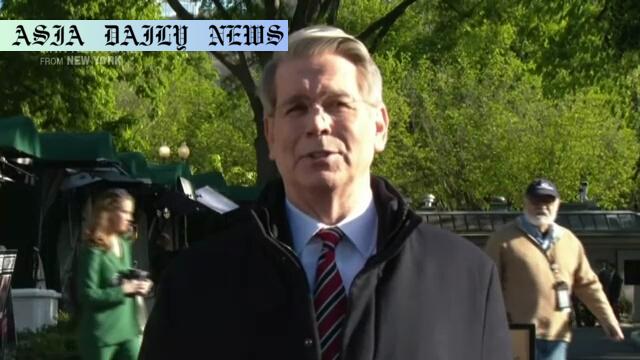Trade Deal – US Treasury Secretary Scott Bessent said the Trump administration might conclude its first trade deal within a week.
US Treasury Secretary Scott Bessent anticipates the completion of the first trade deal soon.
India and various Asian nations are reportedly advancing in negotiations with the US.
Key discussions are expected with Japan as their top negotiator visits Washington this week.

Key Milestone in US Trade Policy
The United States appears to be nearing a crucial moment in its trade policy as Treasury Secretary Scott Bessent hinted at the possibility of wrapping up the first trade deal during the Trump administration. Speaking to reporters on Monday, Bessent said that the deal could be signed “as early as this week or next week.” While he refrained from identifying the exact trading partner likely to seal the agreement, his statements have sparked significant interest in the global trade community.
The Trump administration has made tangible efforts in renegotiating trade terms with its global partners, focusing on reducing the US trade deficit. Nations like India, which are actively engaging in talks, seem to be progressing well in their negotiations. Meanwhile, Japan has also displayed proactive measures by sending its chief negotiator, Akazawa Ryosei, to Washington this week for another round of discussions.
India and Asian Nations Lead the Charge
During his remarks, Bessent highlighted that Vice President JD Vance recently returned from India, where he observed significant progress in trade terms. India, alongside several Asian nations, has presented what Bessent described as “very, very good deals.” This marks a shift in the administration’s bid to reach favorable agreements, which could lead to an amelioration in trade deficits and set the stage for a wave of economic benefits for the US economy.
Key Asian trading partners have seemingly risen to the occasion with compelling trade propositions, and these developments could potentially set a benchmark for other global economies seeking to enter similar agreements with the US. These talks reflect the administration’s broader strategy to enforce fair trade practice and enhance the economic landscape domestically.
Upcoming Talks with Japan
Another significant development in the trade discussions involves Japan’s active role in the negotiation process. Akazawa Ryosei, Japan’s top negotiator, is scheduled to arrive in Washington for a fresh bout of discussions with Treasury Secretary Bessent as early as Thursday. This follow-up meeting indicates a willingness on both sides to resolve tariff disputes and reach a mutually beneficial conclusion.
The presence of key negotiators and their commitment to the process underscore the importance of these talks. Japanese officials have been actively engaging with the US administration to ensure they remain a key trading player, while the US seeks to balance trade flows for greater economic gains.
Trump Administration’s Final Approval
Despite the advancement in negotiations, Treasury Secretary Bessent was clear that President Donald Trump would hold the final say in approving all trade deals. Trump’s administration is known for its strict scrutiny regarding trade talks, ensuring that these agreements align with the broader goals of fairness and equity in global trade.
This approach highlights a meticulous effort to protect American economic interests while fostering stronger diplomatic ties. With tariff negotiations playing a critical role, the future of US trade relations appears primed for a significant transformation.
Conclusion
These developments suggest that the US is on the brink of a potentially prolific new chapter in international trade. With countries like India and Japan showing increasing willingness to cooperate, and Asian nations presenting favorable terms, the Trump administration’s ambitions could soon materialize. Whether these negotiations ultimately fulfill their promise will depend on the final agreements and how they transform trade dynamics globally.



Commentary
An Optimistic Move in US Economic Policy
The possibility of the United States signing its first trade deal under the Trump administration is undoubtedly a significant milestone. Treasury Secretary Scott Bessent’s optimistic declarations showcase the administration’s determination to broker impactful agreements. This comes at a time when the world is watching how the US resituates itself in a global economic order characterized by growing competition and shifting alliances.
The Implications of Asian Engagement
It is particularly interesting to see India and Asian countries emerge as potential frontrunners in these discussions. This signifies the importance of a thriving Indo-Pacific partnership in reshaping global trade practices. For India, such a deal could open up new export markets and strengthen ties with a global superpower. For the US, collaborating with dynamic Asian economies allows it to diversify its partnerships and reduce its reliance on particular trading blocs.
The Road Ahead
However, challenges remain. The intricate process of negotiating tariffs, resolving disputes, and ensuring mutual benefits in trade deals is no easy feat. As Bessent mentioned, while the progress seems promising, ultimate decisions rest with President Trump, whose evaluation will be informed by how these deals align with his broader economic goals.
Indeed, whether the optimism surrounding these developments translates into results will be a testament to the diplomacy and strategy employed by the US and its partners. These negotiations pave the way for significant economic transformations, and close attention to their progress is imperative.